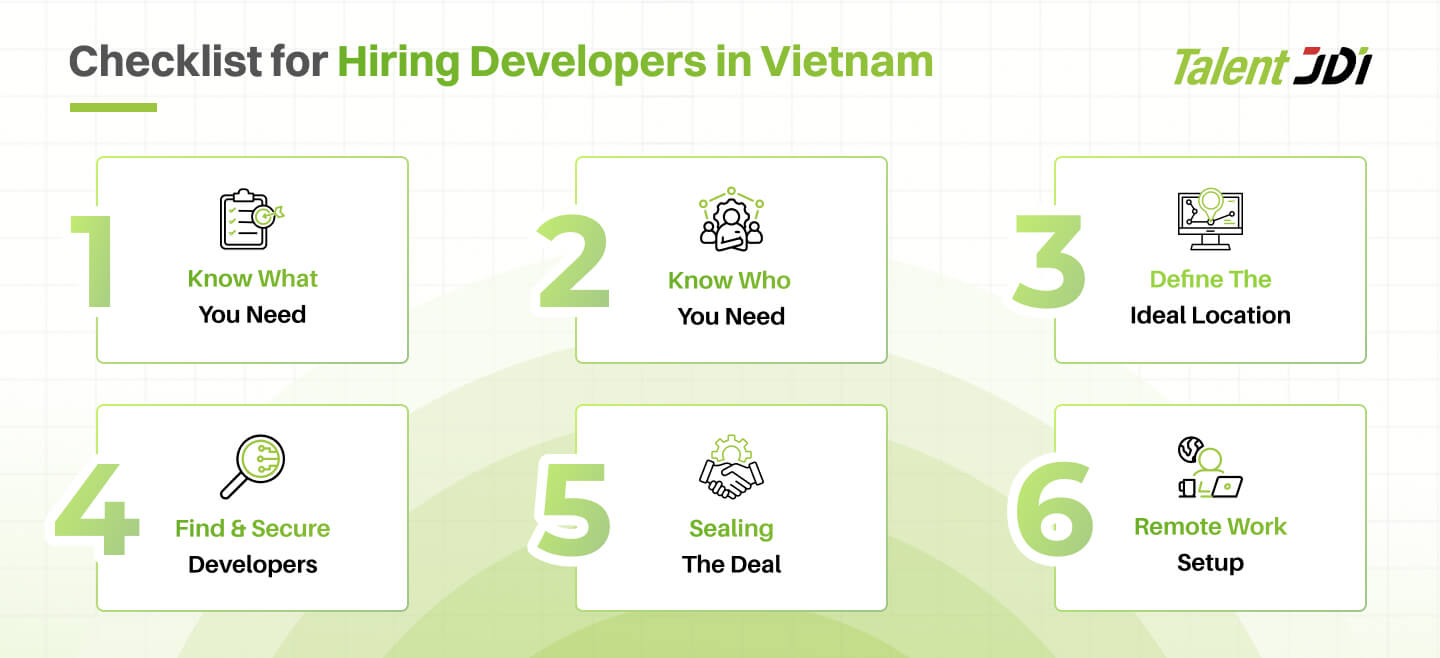 (1).jpg?w=3840&q=100)
How to Hire Remote Developers in Vietnam: A Complete Guide
AUTHOR
Talent JDI
READ TIMES
1 minutes
LAST UPDATED
Jan 30, 2026
As firms from Singapore and the US seek to scale their tech teams, many are opting to hire remote developers in Vietnam to circumvent the constraints of local talent shortages.
Knowing you need to scale is one thing — making it happen in a foreign market is another. For many companies, navigating the hiring landscape abroad can be overwhelming, especially the first time around.
So, what does it really take to build a strong tech team in Vietnam and get it right from day one? We break it all down in today’s guide.
Why Hire Remote Developers In Vietnam?

But before diving into the process, let’s explore why so many businesses are eager to tap into Vietnam’s tech talent pool. With over 80,000 developers currently working and another 80,000 fresh graduates entering the workforce each year, Vietnam boasts one of the largest tech talent pools in the region. That means companies have a much better chance of finding the right developers to meet their needs.
Another major draw is the salary advantage. Developer wages in Vietnam rank among the lowest in the region, typically 40% to 80% less than those in Singapore or the US. In other words, businesses can build at least two dedicated tech teams in Vietnam for the cost of one locally based team.
On top of that, most software engineers, especially younger professionals and those in tech hubs like Hanoi and Ho Chi Minh City, can communicate efficiently in English, ensuring that remote collaboration is smooth and not a significant challenge.
In summary, these are the key reasons businesses are betting on Vietnam when looking to hire remote developers:
- Large and Growing Talent Pool
- Cost Efficiency
- Strong Technical Skills
- Cultural Compatibility
- Lower Operational Costs
- English Proficiency
Wondering why everyone’s talking about Vietnam for tech hiring? Read the insights from our webinar to find out and learn how to make it work for you!
Checklist on How to Hire Remote Developers in Vietnam

1. Know What You Need
The first step is to decide what kind of hiring approach you want and how you plan to collaborate with remote developers in Vietnam.
Employment Duration | Short Term (Less Than 1 Year) | Long Term (More Than 1 Year) | Long Term (More Than 1 Year) |
Budget | Low — not ideal for full-time hires | Sufficient for full-time developers | Sufficient for full-time developers |
Management | Minimal management — focus on tracking milestones | Want to manage developers without handling HR and legal issues | Want full control and are willing to manage HR and legal processes |
Best Hiring Model | Freelancer | Indirect Employment | Direct Employment |
Pros | Low cost Quick and easy to hire | Access to top talent Good quality control
| Strong quality control |
Cons | Quality control and security concerns Limited scalability | Takes time to hire Need to find trusted partners | Time-consuming hiring process Costly Requires a legal entity and HR/admin support |
2. Know Who You Need
The next important step is to clearly define the type of developer you want to bring on board. Are you looking for a specialist in mobile apps, a frontend expert, or someone skilled in backend development? Being specific will help you focus your search.
Think about these key points:
- What specific challenges or issues should the developer be able to address?
- Which programming languages, frameworks, or technologies must they be proficient in?
- What level of experience or past roles are necessary?
- Are there additional requirements, like effective English communication skills?
By outlining these criteria clearly in a detailed job description, you’ll be able to target the right talent from Vietnam’s rich pool of developers. This also helps set realistic expectations and align your budget with the market.
Keep in mind that regularly revisiting and refining your job description is essential. What you believe will attract candidates may not always match what they’re actually looking for, so staying flexible ensures you remain competitive.
Interested in what exactly how much you should pay for developers in Vietnam? Check out: Vietnam Developer Salary Report!
3. Identify The Ideal Location To Hire Remote Developers
The next step is to choose the best location to maximize your reach to developers. Like many countries, Vietnam has key tech hubs, with Ho Chi Minh City, Hanoi, and Danang accounting for around 96% of the country’s developers.
Each city offers unique advantages that can impact your hiring experience. While location might matter less if you’re hiring freelancers, keep in mind that salary expectations can vary significantly depending on the city a developer is based in.
4. Learn How To Find & Secure Remote Developers in Vietnam
In Vietnam, there are many effective platforms, channels, and communities to connect with talented remote developers. Knowing how to leverage these resources gives businesses a significant edge in finding the right candidates.
Employment Type | Freelancers | Full-Time Developers |
Dev Platforms | Upwork, Freelancer, Fiverr | VietnamWorks, TopDev, ITviec |
Dev Channels | LinkedIn, Facebook Groups | LinkedIn, Job Portals, Company Websites |
Dev Communities | GitHub, Stack Overflow, Reddit | Local Tech Meetups, Slack Groups, Facebook Communities |
Recruitment Partners | Freelance Agencies (e.g., JDI Central) | Local Recruitment Firms, Headhunters (e.g., Talent JDI) |
💡Pro Tips on Finding Developers in Vietnam:
- Offer a salary in net (take-home pay), as this is preferred and clearer for candidates
- Developers appreciate job descriptions written in English
- Many developers are passive job seekers, so reaching out to them directly is often most effective
- However, they usually prefer receiving messages in Vietnamese, which shows respect and increases response rates
5. Closing the Deal With Legal Documentation
Once you’ve completed all the interviews and secured a developer from Vietnam, the next step is to finalize the agreement by completing the legal employment process.
Whether the developer works as a freelancer or a full-time employee, Vietnam has strict labor laws designed to protect workers and ensure businesses take full responsibility for their staff. This means companies must carefully manage all employment-related legal documents and obligations.
Hiring Model | Freelancer | Indirect Employment (through agency/partner) | Direct Employment |
| Who Handles Employment Contracts? | Handled by both the client and the freelancer | Often managed by the agency | Managed directly by your business |
| Tax Obligations & Social Insurance | Freelancer handles their own | The agency takes care of compliance | Your company is responsible |
| Compliance with Local Labor Laws | Less strict | Agency ensures compliance | Your company must comply |
| Intellectual Property (IP) Rights | Should be defined in the contract | Covered by agency agreement | Managed through the employment contract |
| Data Protection & Privacy Laws | Client responsible | Agency handles | Your company responsible |
| Work Permit & Visa (if relocating developers abroad) | N/A | Usually handled by the agency if applicable | Your company must manage |
6. Set up Remote Working Environment and Management
The final—and equally important—step when hiring remote developers in Vietnam is ensuring they have the best environment to succeed. Companies should focus on several key areas, including:
- Establishing clear remote work policies, with cybersecurity measures
- Investing in the right software, technology, and IT support
- Encouraging a collaborative and inclusive work culture
- Integrating new hires smoothly into existing workflows and teams
- Defining clear performance metrics and expectations
- Conducting regular check-ins and virtual meetings to maintain communication
Providing these conditions helps remote developers stay productive, engaged, and aligned with company goals.
Interested in how to run a remote team of developers in Vietnam? Check out our detailed guide here.
Pitfalls To Avoid When Hiring Remote Developers In Vietnam

1. Cultural Differences: Vietnamese culture tends to be hierarchical, where direct criticism might come across as disrespectful. Taking time to build strong relationships and reading non-verbal cues is essential.
2. Communication Preferences: While many younger developers speak fluent English, some may feel more comfortable communicating in Vietnamese, so adapting accordingly can improve collaboration.
3. Low Hiring Season: From October to January, the hiring market slows down. During this period, offering more attractive packages may be necessary to secure top talent.
4. Inadequate Screening: Rushing the hiring process or skipping thorough assessments can lead to mismatched skills and a poor fit.
5. Overlooking Soft Skills: Focusing only on technical abilities may miss key traits like communication and teamwork that affect remote collaboration.
7. Ignoring Market Rates: Offering salaries below market expectations can result in losing top candidates or extended hiring times.
How Smart Companies Accelerate Their Hiring Process
Recruiting tech talent in Vietnam is a strategic move, but the process could be time-consuming for new entrants. That’s where Talent JDI comes in.
With a network of 16,000+ skilled tech candidates, Talent JDI helps businesses secure top tech talent in a matter of weeks.
We take care of everything—from sourcing top talent to seamless onboarding—allowing you to focus on scaling your business. More than just a service, we’re a trusted partner, having empowered over 200 businesses and enterprises worldwide to unlock Vietnam’s thriving tech talent pool and drive innovation at scale.
Reach out to us and share your requirements—we’ll make it happen!
